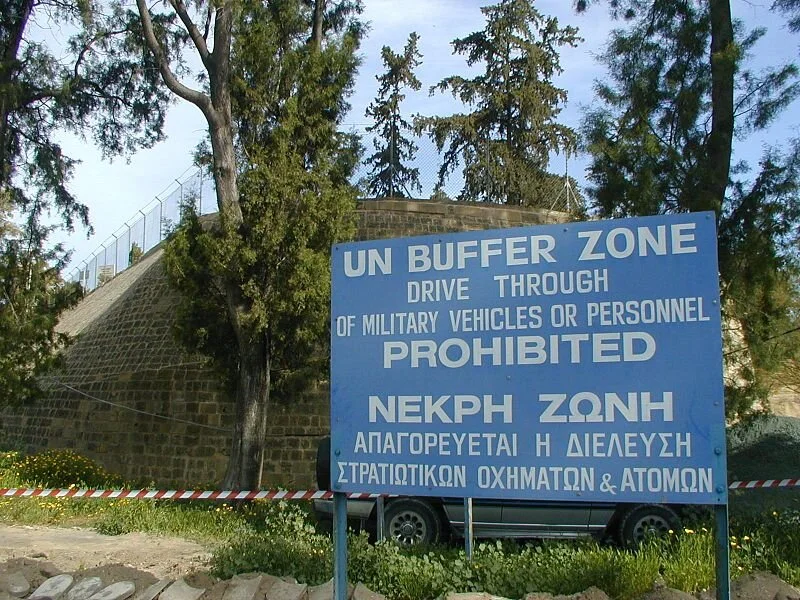Why the Cyprus Conflict Requires International Intervention
In the first semester of my graduate studies, I took a course titled, “Introduction to Conflict Resolution.” In this course, I spent countless hours learning and writing about the Turkish invasion and continued occupation of one third of the territory of the Republic of Cyprus. At the time, I could have never imagined that come June I would be standing in the “buffer zone” between the free Republic of Cyprus and the Turkish occupied territory. How exactly did I go from studying the conflict to standing right in the middle of it?
After working as an intern for the American Hellenic Institute for a year, I was presented with the opportunity to attend the institute’s annual foreign policy trip to Greece and Cyprus. I jumped at the chance to visit Cyprus for the first time and to complement my research by observing the conflict firsthand. I can say with complete confidence that after writing multiple papers on the conflict I only knew a fraction of what I would learn on this trip. This experience ultimately stressed the importance of international support, and how it could be pivotal in reunifying the Republic of Cyprus and facilitating reconciliation among the communities affected by Turkish occupation.
The Cyprus conflict is an ongoing issue in the international community. The conflict is considered a “frozen” conflict, which Freedom House defines as a conflict in which active fighting has ended or subsided, but lacks any peace agreement beyond a tenuous ceasefire. This conflict remains highly relevant for Cypriots, whose daily lives are consistently affected by its lasting consequences. Before this trip, I attributed most of the conflict’s resulting contention to the geographical boundary where Turkey illegally occupies the territory of the Republic of Cyprus. After this trip, I now better understand the conflict’s complexities and how tensions consistently influence Cyprus’s geography, politics, civil society, and economy. For instance, currently there is a debate over hydrocarbon exploration within the economic exploration zone (EEZ) and territorial waters of Cyprus. Turkey objected to Cyprus’s right to a continental shelf and blocked its economic exploration of its maritime borders due to Turkey’s perceived rights over waters surrounding Cyprus. Despite Turkey’s consistent violation of Cypriot sovereignty, the international community has not taken further action against Turkey’s illegal occupation.
As a member of the European Union and United Nations, Cyprus exists within a framework of laws, rules, and standards established by treaties and customary international law. However, on a daily basis, Turkey violates and undermines these laws, rules, and standards. Provocative Turkish actions violate Cypriot airspace, maritime borders, and at times, even the UN-delineated buffer zone. As a result, Cypriots living within the Republic of Cyprus exist in a constant state of fear and insecurity. Instead of acting against the illegal occupation of EU territory, the EU provided incentives to citizens living under Turkish army control. Since 2006 over 450 million euros were allocated to the Turkish Cypriot community under the EU Aid Program as an incentive for cooperation and support for the reunification process. However, this hope for cooperation is futile if not complemented with decisive action. The EU and the UN have failed to safeguard Cypriot sovereignty and territory which has resulted in a lack of positive change on the issue. Outside actors, such as the EU, must threaten to revoke current “incentives” and, in doing so, increase pressure on Turkey to cede occupied territory.
It was a surreal experience to stand in the “buffer zone,” between the free Republic of Cyprus and the Turkish-occupied territory. My emotions were on edge physically standing in the middle of a conflict zone. I do not know if it was a result of spending hours learning about the complexity of the issue from Cypriot and U.S. government officials, but there was palpable tension in the air. It made me feel like a target for the Turkish army—an army that controls the occupied area and is resistant to a solution that would jeopardize their control. In the “buffer zone,” there is the old Nicosia Airport, which was attacked in 1974 by Turkish forces. I get goosebumps merely thinking about how it felt to see this airport. The landscape is arid and the airport is abandoned, appearing like a ghost town. I was disheartened to know that so many civilians and soldiers died in the attacks there, and that the conflict is still unresolved 44 years later. Cypriots feel that lack of closure daily, demonstrating that frozen conflicts have a lasting impact on communities.
While the conflict has not seen armed violence for decades, the possibility of violence remains relevant and palpable. The United Nations Peacekeeping Force in Cyprus (UNFICYP) is the main, if not the only, force ensuring peace within the region. The current U.S. administration is considering a decrease in, or even the removal of, funding for the UNFICYP. This would be a detrimental mistake. Instead, The U.S. government should prioritize continued funding to the UNFICYP, encouraging negotiations leading to a peace agreement, and promoting the Republic of Cyprus as a pillar of stability in the region. Visiting with the UN peacekeepers personally highlighted how peace in the region is dependent on the presence of capable UN forces. As Turkish authoritarianism and anti-American sentiment grow, the importance of the reunification and reconciliation of the Republic of Cyprus is more important now than ever.
